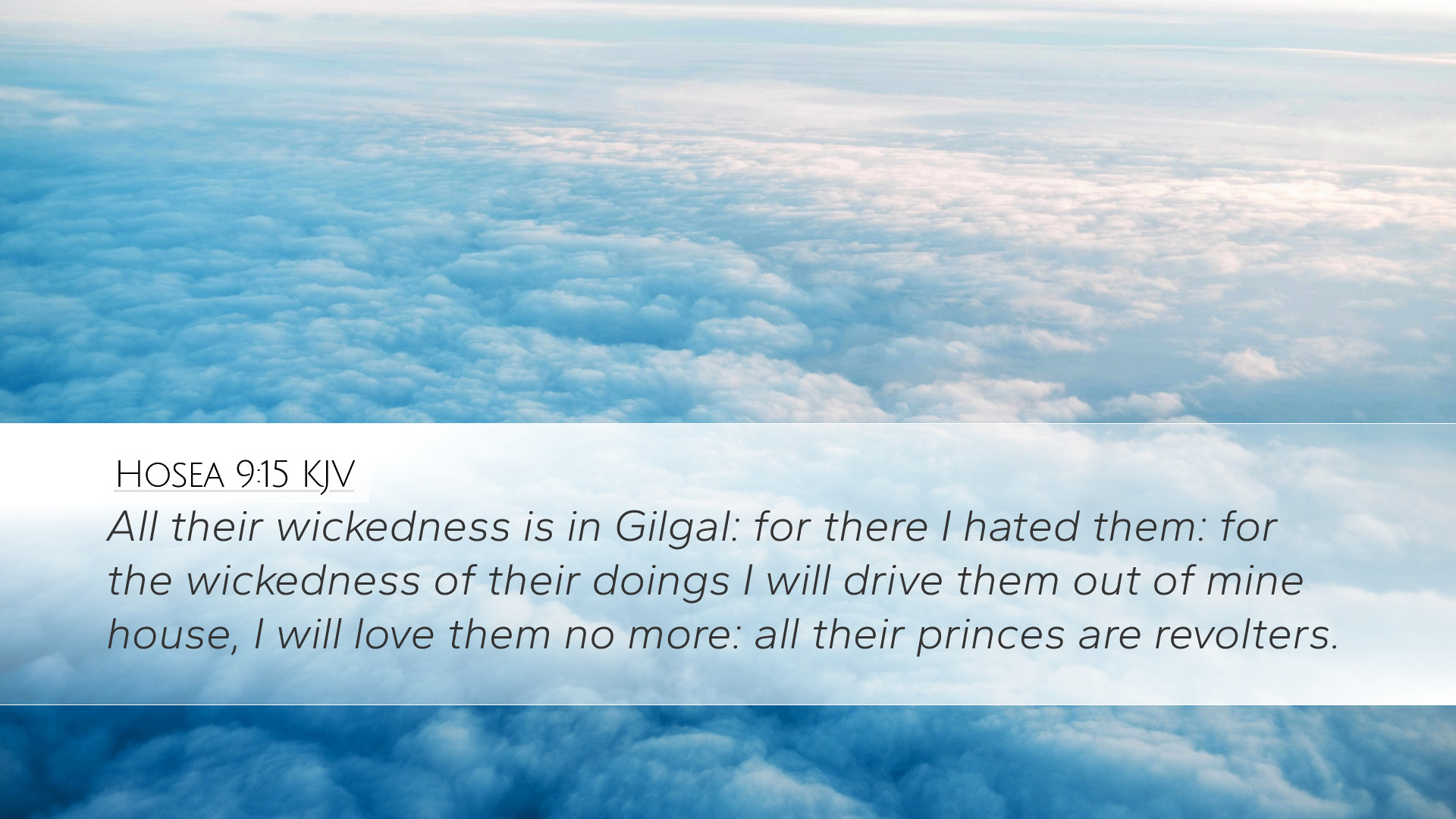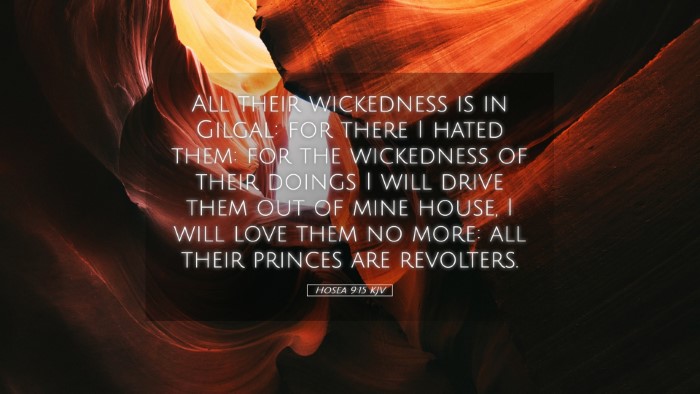Old Testament
Genesis Exodus Leviticus Numbers Deuteronomy Joshua Judges Ruth 1 Samuel 2 Samuel 1 Kings 2 Kings 1 Chronicles 2 Chronicles Ezra Nehemiah Esther Job Psalms Proverbs Ecclesiastes Song of Solomon Isaiah Jeremiah Lamentations Ezekiel Daniel Hosea Joel Amos Obadiah Jonah Micah Nahum Habakkuk Zephaniah Haggai Zechariah MalachiHosea 9:15
Hosea 9:15 KJV
All their wickedness is in Gilgal: for there I hated them: for the wickedness of their doings I will drive them out of mine house, I will love them no more: all their princes are revolters.
Hosea 9:15 Bible Commentary
Commentary on Hosea 9:15
Text of Hosea 9:15: "All their wickedness is in Gilgal: for there I hated them: for the wickedness of their doings I will drive them out of mine house. I will love them no more: all their princes are rebels."
Introduction
The book of Hosea is an eloquent portrayal of God's relationship with Israel, showing His unyielding love despite their persistent unfaithfulness. Hosea 9:15 serves as a poignant declaration of divine judgment, reflecting on the profound reality of Israel's spiritual decline.
Commentators agree that this verse encapsulates a turning point where God's tolerance reaches its limit, emphasizing the consequences of national sin.
Insights from Matthew Henry
Wickedness in Gilgal: Matthew Henry emphasizes that Gilgal was a site of great significance in Israel's history, being associated with the beginnings of the nation in the Promised Land. However, it later became a hub of idolatry and corruption. This duality symbolizes Israel's spiritual downfall, as they not only rejected God's commands but also corrupted holy places.
Divine Hatred and Judgment: In Henry's view, the phrase "for there I hated them" reflects God's righteous displeasure towards their deeds. It reveals that divine love can coexist with divine hatred when faced with sin. God's hatred here speaks not to a capricious emotion but rather to His righteous indignation against iniquity.
Driving Them Out: Henry comments that God’s promise to drive them out of His house illustrates the removal of His presence and protection, which is the ultimate punishment for Israel's rebellion. The imagery employed suggests a spatial separation reflecting a moral and spiritual distance caused by their actions.
Insights from Albert Barnes
Context of Gilgal: Barnes highlights that Gilgal was known as a place of significant events, such as the circumcision of Joshua and the first Passover in the land (Joshua 5). Yet, it became tainted by false worship and rebellion. Such a transformation underscores the danger of failing to maintain holiness and fidelity to God amid privilege.
Rebellion of Princes: The mention of "all their princes are rebels" suggests a leadership void—where those in authority are leading the nation away from God rather than towards Him. Barnes notes that the leaders' actions reflect a collective attitude that permeates the nation.
No More Love: Barnes points out the sobering reality of God's declaration, "I will love them no more." It serves as a warning about the potential for divine love to be withdrawn as a consequence of persistent unrepentant sin—a theme that reverberates throughout the Scriptures.
Insights from Adam Clarke
The Role of Gilgal: Clarke elaborates on the significance of Gilgal as the place where Israel first experienced God's covenant and favor. The abandonment of this holy site for acts of wickedness illustrates a profound betrayal of their covenant relationship with Yahweh.
God's Sovereignty in Judgment: Clarke asserts that God's judgment is not arbitrary but rather a necessary response to human sinfulness. His assertion that "I will drive them out of mine house" signifies that He will not tolerate the amalgamation of holy and profane—God’s residence must embody righteousness.
Rebel Leaders: He also emphasizes the gravity of the leaders being characterized as rebels, which points to a systemic breakdown in moral authority and encourages a spiritual introspection regarding leadership in Israel. This condemnation of Israel’s leaders speaks volumes about the responsibility that comes with authority.
Theological Implications
Divine Justice and Human Accountability: These commentaries point to a critical aspect of God's nature—His justice. The biblical narrative strongly suggests that human actions have divine repercussions, reminding contemporary readers of their responsibility before God.
The Consequence of Idolatry: As Gilgal became a center of idolatrous worship, the text serves as a stark warning against turning away from the true God. Isaiah 44:9-20, for example, speaks similarly about the futility of idols and the consequences of forsaking God.
Understanding Divine Love and Hatred: Hosea 9:15 presents a nuanced view of God’s love that can turn into righteous displeasure. This duality challenges believers to examine their relationship with God in the light of holiness and obedience.
Practical Applications
- Reflection on Personal Sin: Ministers and laity alike are called to consider the implications of personal and communal sin. Where might our modern “Gilgals” be? Where do we slip into complacency or idolatry?
- Examine Leadership: Church leaders should reflect on their responsibilities to guide their communities towards righteousness and not rebellion.
- Encouragement to Return: Despite the grim warnings in Hosea, the call for repentance remains. This text serves as an invitation for renewal and a return to the faithfulness of God.
Conclusion
The commentary on Hosea 9:15 emphasizes the severity of God’s relationship with a wayward Israel. The convergence of their choices at a once-holy site reflects a continuous journey that remains relevant today. For pastors, students, theologians, and scholars, the message is one of caution, urging us not to forsake our covenant with God.
In studying this passage, we see the need for fidelity to God, the importance of honest leadership, and the recognition that persistent sin can sever our relationship with God, presenting a real and pressing need for repentance and renewal.


